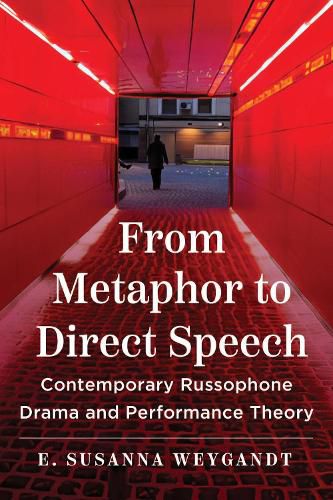Readings Newsletter
Become a Readings Member to make your shopping experience even easier.
Sign in or sign up for free!
You’re not far away from qualifying for FREE standard shipping within Australia
You’ve qualified for FREE standard shipping within Australia
The cart is loading…






New Drama-a collection of actors, directors, and playwrights in Russia, Ukraine, and Belarus-is one of the most active and vibrant artistic movements in the Russophone world today yet remains understudied in the West. E. Susanna Weygandt demonstrates that the major innovation of New Drama is a sonic turn, an aesthetic development that moves away from traditional, Stanislavskian embodied performance to something almost purely aural. New Drama, which began in the tumult following the collapse of the Soviet Union and continues even in an increasingly censorious Russia today, emphasizes contemporary social issues and privileges disadvantaged voices, using documentary modes to literally bring the voices of the dispossessed to the ears of the audience members.
As a result, the Russophone New Dramatists speak dissent and dramatize resistance. Ultimately, they shift theatrical productions from something constrained and limited, in both place and time, to an ephemeral but unbounded gateway for social activism. The sonic stage thus effectively functions as a social forum, transposing action from the actors to the audience. From Metaphor to Direct Speech therefore contributes to cultural as well as performance studies, offering a compelling look not just at developments in theatrical modes but also at dissent and cultural aesthetics in Russia today.
$9.00 standard shipping within Australia
FREE standard shipping within Australia for orders over $100.00
Express & International shipping calculated at checkout
New Drama-a collection of actors, directors, and playwrights in Russia, Ukraine, and Belarus-is one of the most active and vibrant artistic movements in the Russophone world today yet remains understudied in the West. E. Susanna Weygandt demonstrates that the major innovation of New Drama is a sonic turn, an aesthetic development that moves away from traditional, Stanislavskian embodied performance to something almost purely aural. New Drama, which began in the tumult following the collapse of the Soviet Union and continues even in an increasingly censorious Russia today, emphasizes contemporary social issues and privileges disadvantaged voices, using documentary modes to literally bring the voices of the dispossessed to the ears of the audience members.
As a result, the Russophone New Dramatists speak dissent and dramatize resistance. Ultimately, they shift theatrical productions from something constrained and limited, in both place and time, to an ephemeral but unbounded gateway for social activism. The sonic stage thus effectively functions as a social forum, transposing action from the actors to the audience. From Metaphor to Direct Speech therefore contributes to cultural as well as performance studies, offering a compelling look not just at developments in theatrical modes but also at dissent and cultural aesthetics in Russia today.